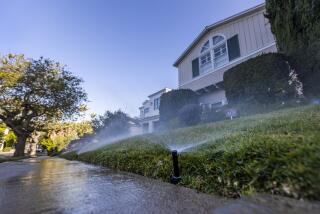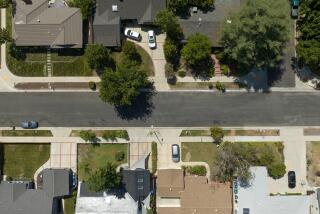Do drought-related water restrictions take precedence over lease requirements?
- Share via
QUESTION: I rent a house that’s located in a Torrance-area homeowner association. My landlord has referred to the rental agreement that I signed as the “standard real estate form” published by a trade association and used by real estate brokers. In that form there’s a paragraph stating: “Tenants shall water the garden, landscaping, trees and shrubs.”
Considering watering restrictions imposed because of California’s severe drought, do I have to follow the lease? If I fail to comply with that clause it is considered a breach of the lease and can I be liable for damages? The homeowner association’s monthly newsletter states that “residents who let their front yards and landscape go brown will be fined.”
I want to do my part in reducing water use but fear I am contractually bound to waste water keeping the yard green in order to avoid homeowner association fines and breaking my lease. What do I do?
ANSWER: The clause stating that “Tenants shall water the garden, landscaping, trees and shrubs” may be against public policy and unenforceable due to Southern California’s continuing drought conditions.
El Nino rains hit northern California and the Sierra Nevada hard this past winter, prompting the State Water Resources Board last month to give local governments more flexibility in reducing water usage, but Southern California once again experienced a record dry year. Gov. Brown has not lifted a Drought State of Emergency he declared in January 2014, which has led to the adoption of laws protecting homeowners and association members who reduce outdoor water usage.
In July 2015, the governor signed a bill that adds Section 8627.7 to the Government Code. It states that during a state of emergency based on drought conditions “a city, county, or city and county shall not impose a fine under any ordinance for a failure to water a lawn or for having a brown lawn.”
That followed a law that went into effect in 2014 that amended Section 4735 of the Civil Code. It expressly prohibited a common interest development from imposing a fine or assessment against a member for reducing or eliminating watering of vegetation or lawns during a water emergency declared by the state or local government.
But even though the governor and Legislature have made their intentions clear — namely that citizens should reduce water consumption for lawn care and should not be penalized for their conservation efforts — it is not in your best interest to simply ignore the terms of your lease or the association’s correspondence.
You should bring the unenforceable, and potentially illegal, requests of your landlord and association to their attention — and do so in writing. If there is still confusion about the serious emergency that exists in our state, you can try enlisting the assistance of your local water supplier, state water conservation agencies or your state legislator. There is plenty of information available on the need to reduce water use, especially for landscaping purposes.
If your landlord or the association continues to ignore the mandates of the California government, you can report this association to your local water supplier for frustrating your conservation efforts. You can even bring your own lawsuit for declaratory relief asking the court to issue a ruling regarding the enforceability of any action that interferes with your efforts to save water.
Owners who paid fines, fees or penalties to their landlord or association for alleged increases in water usage may file in small claims court. Take the invoices and statute with you to court and ask for reimbursement.
Zachary Levine, a partner at Wolk & Levine, a business and intellectual property law firm, co-wrote this column. Vanitzian is an arbitrator and mediator. Send questions to Donie Vanitzian, JD, P.O. Box 10490, Marina del Rey, CA 90295 ornoexit@mindspring.com
More to Read
Inside the business of entertainment
The Wide Shot brings you news, analysis and insights on everything from streaming wars to production — and what it all means for the future.
You may occasionally receive promotional content from the Los Angeles Times.










